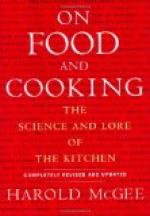ORANGEADE.—Pare very thin from one orange a few bits of the yellow rind. Slice three well-peeled sour oranges, taking care to remove all the white portion and all seeds. Add the yellow rind and a tablespoonful of sugar; pour over all a quart of boiling water. Cover the dish, and let it remain until the drink is cold. Or, if preferred, the juice of the oranges may be extracted with a lemon drill and strained as for lemonade.
PINEAPPLE BEVERAGE.—Pare and chop quite fine one fresh pineapple; add a slice or two of lemon, and cover with three pints of boiling water. Let it stand for two hours or more, stirring frequently; then strain and add the juice of five lemons, and sugar or syrup to sweeten.
PINEAPPLE LEMONADE.—Lemonade made in the usual manner and flavored with a few spoonfuls of canned pineapple juice, is excellent for variety.
PINK LEMONADE.—Add to a pint of lemonade prepared in the usual manner half a cup of fresh or canned strawberry, red raspberry, currant, or cranberry juice. It gives a pretty color besides adding a pleasing flavor.
SHERBET.—Mash a quart of red raspberries, currants, or strawberries, add the juice of a lemon, and pour over all three pints of cold water. Stir frequently, and let it stand for two or three hours. Strain through a jelly bag, sweeten to taste, and serve.
TISANE.—This is a favorite French beverage, and is prepared by chopping fine a cupful of dried fruits, such as prunes, figs, or prunelles, and steeping for an hour in a quart of water, afterward straining, sweetening to taste, and cooling on ice before using.
TABLE TOPICS.
The nervousness and peevishness of our times are chiefly attributable to tea and coffee. The digestive organs of confirmed coffee drinkers are in a state of chronic derangement which reacts on the brain, producing fretful and lachrymose moods. The snappish, petulant humor of the Chinese can certainly be ascribed to their immoderate fondness for tea.—Dr. Bock.
Dr. Ferguson, an eminent physician who has carefully investigated the influence of tea and coffee upon the health and development of children, says he found that children who were allowed these beverages gained but four pounds a year between the ages of thirteen and sixteen, while those who had been allowed milk instead, gained fifteen pounds in weight during the same period.
Dr. Richardson, the eminent English physician and scientist, asserts that the misery of the women of the poorer classes of the population in England is more than doubled by the use of tea, which only soothes or stimulates to intensify the after-coming depression and languor.
A physician recommended a
lady to abandon the use of tea and coffee.
“O, but I shall miss
it so,” said she.
“Very likely,”
replied her medical adviser, “but you are missing
health now, and will soon
lose it altogether if you do not.”




